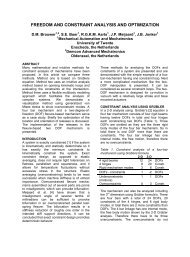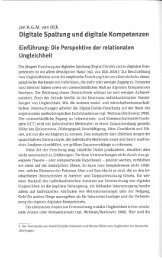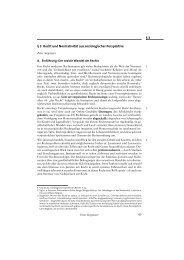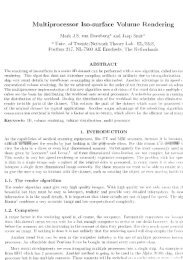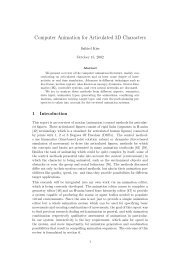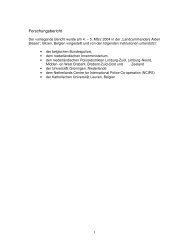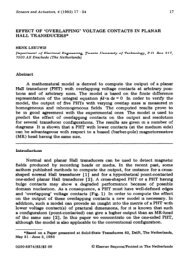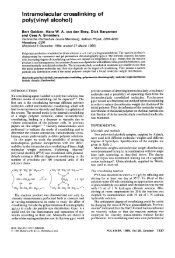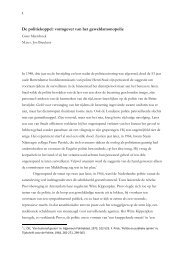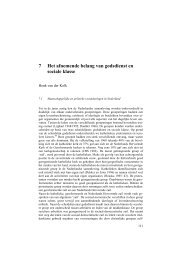Innovation and institutional change: the transition to a sustainable ...
Innovation and institutional change: the transition to a sustainable ...
Innovation and institutional change: the transition to a sustainable ...
Create successful ePaper yourself
Turn your PDF publications into a flip-book with our unique Google optimized e-Paper software.
36 Chapter 2<br />
production <strong>and</strong> consumption (Mol, 1995: 29; Van Vliet 2002: 14). Mol<br />
(1995) analyses environment-induced <strong>institutional</strong> transformations in <strong>the</strong><br />
Dutch chemical industry. He evaluates six hypo<strong>the</strong>ses central <strong>to</strong> ecological<br />
modernisation <strong>the</strong>ory <strong>to</strong> investigate <strong>the</strong> explana<strong>to</strong>ry potential of <strong>the</strong> <strong>the</strong>ory.<br />
Basically <strong>the</strong>y contend that ecological considerations become increasingly<br />
integrated in<strong>to</strong> <strong>the</strong> economic, political <strong>and</strong> societal sphere. Thus in modern<br />
society <strong>the</strong> ecological sphere gains growing independence, emancipation <strong>and</strong><br />
empowerment (Mol, 1995: 63). The analytical model Mol uses is <strong>the</strong> socalled<br />
triad-network approach. According <strong>to</strong> Mol this approach is useful for<br />
analysing meso-level transformations (economic sec<strong>to</strong>rs) which is <strong>the</strong> level<br />
most appropriate <strong>to</strong> underst<strong>and</strong> <strong>change</strong>s in production-consumption<br />
systems 6 . Moreover <strong>the</strong> networks in <strong>the</strong> approach can be directly related <strong>to</strong><br />
<strong>the</strong> basic tenets of ecological modernisation <strong>the</strong>ory as <strong>the</strong> networks represent<br />
<strong>the</strong> economic, political <strong>and</strong> societal sphere. He distinguishes three<br />
interdependent networks, <strong>the</strong> policy network, economic network, <strong>and</strong><br />
societal network. Each network has its own restricted number of interacting<br />
ac<strong>to</strong>rs (labelled core <strong>and</strong> peripheral ac<strong>to</strong>rs) <strong>and</strong> its own distinctive<br />
<strong>institutional</strong> arrangements.<br />
For <strong>the</strong> policy network Mol focuses on four dimensions: 1) <strong>the</strong> rules of <strong>the</strong><br />
game; 2) <strong>the</strong> different resources used; 3) <strong>the</strong> strategies between industry <strong>and</strong><br />
government, <strong>and</strong> 4) <strong>the</strong> appreciative systems. Rules of <strong>the</strong> game concern <strong>the</strong><br />
way interactions take place (e.g. from few contacts, diverging interests <strong>and</strong> a<br />
confrontational nature <strong>to</strong> regular consultation, mutual trust <strong>and</strong> respecting<br />
each o<strong>the</strong>rs interests <strong>and</strong> confidences with less use of legal remedies in <strong>the</strong><br />
case of one industrial branch); <strong>and</strong> <strong>the</strong> level of openness of <strong>the</strong> network (both<br />
in terms of ac<strong>to</strong>rs <strong>and</strong> of issues). With regard <strong>to</strong> resources Mol pays attention<br />
<strong>to</strong> <strong>the</strong> distribution <strong>and</strong> use of legal resources (authority), economic <strong>and</strong><br />
financial resources, <strong>and</strong> informational resources. Strategies can include<br />
insulation (keeping government away), penetration (e.g. by industry in<br />
government <strong>to</strong> safeguard interest), mutual adaptation, <strong>and</strong> interorganisational<br />
concertation (co-operation through mutual underst<strong>and</strong>ing of each o<strong>the</strong>r’s<br />
position <strong>and</strong> interests). Appreciative systems concern <strong>the</strong> dominant ideology<br />
or world view in <strong>the</strong> policy network that promote <strong>and</strong> legitimise specific<br />
action strategies (or solutions) (Mol, 1995: 71).<br />
For <strong>the</strong> economic networks Mol analysed, inspired by <strong>the</strong> industrial network<br />
approach, in what way <strong>and</strong> <strong>to</strong> what extent interactions (vertical, horizontal<br />
<strong>and</strong> o<strong>the</strong>r) between constituents of industrial networks remained <strong>the</strong> same or<br />
transformed in confrontation with <strong>the</strong> stronger emergence of environmental<br />
6 According <strong>to</strong> Mol (1995: 62) analysis at <strong>the</strong> micro level may miss inter-firm <strong>change</strong>s <strong>and</strong><br />
sec<strong>to</strong>ral <strong>change</strong>s, while <strong>the</strong> macro-level would abstract from relevant environment-induced<br />
inter-firm transformations by putting <strong>to</strong>o much emphasis on <strong>the</strong> net national effect.



